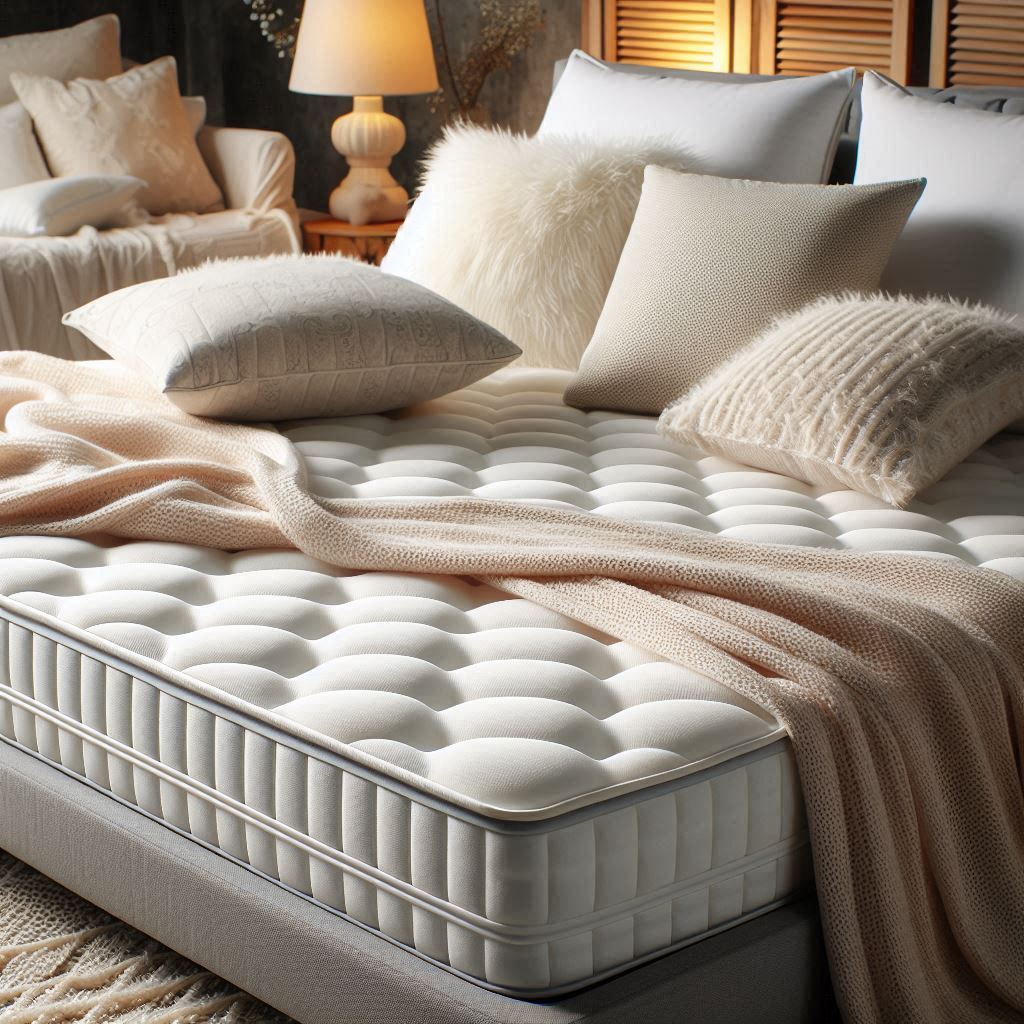Sleep deeper with memory foam mattresses UK—comfort, support & pressure relief designed for restful nights. Upgrade your bed today.
Introduction
A good night’s sleep is key to your health. The right mattress makes a big difference. Memory foam has changed sleep for many people. It gives steady support, eases pressure, and lasts well.
This guide covers memory foam mattresses in the UK. You’ll learn how they work and how to choose one. We’ll show why they help you sleep deep and wake refreshed.
What is Memory Foam?
How it Molds to Your Body
Memory foam is a viscoelastic material that responds to heat and pressure, contouring to the body's shape. This unique adaptability allows for personalised comfort and support.
Why it Improves Sleep Quality
By evenly distributing weight, memory foam minimises pressure points, reduces tossing and turning, and enhances overall sleep quality.
Why Choose Memory Foam?
Relieves pressure points
Memory foam hugs your body and eases stress on joints and muscles.
It targets shoulders, hips, and the lower back.
Supports spine alignment
It shapes to you and keeps your spine in a natural line.
This helps prevent stiffness and back pain.
Reduces motion transfer
It absorbs movement instead of bouncing it across the bed.
You stay asleep when your partner turns or gets up.
UK Memory Foam Sizes
Single, Double, King, Super King
Memory foam mattresses in the UK come in various sizes to suit different sleeping needs and room sizes.
Which Size Fits Your Space?
The right size depends on room dimensions, sleeping preferences, and whether the bed is shared.
Types of Memory Foam
· Standard memory foam
Soft and body-hugging for high pressure relief. Spreads weight evenly to ease joints and muscles; great if you want plush comfort with steady support.
Gel helps draw heat away so you sleep cooler. Best for hot sleepers or warm rooms.
Airy, breathable foam with tiny open pockets. Improves airflow, limits heat build-up, and feels fresher through the night.
Best Firmness for Deep Sleep
Soft – plush comfort & pressure relief
Soft memory foam feels cushioned and cosy. Great for side sleepers needing contour at shoulders and hips; it eases pressure and supports spinal alignment.
Medium – balanced support & versatility
Medium-firm suits most sleepers. It blends contour and lift, ideal for people who switch between side, back, and stomach positions.
Firm – extra stability & spinal support
Firm foam gives more lift and less sink. Best for back and stomach sleepers; it keeps the spine straight and helps reduce lower-back strain.
Memory Foam vs. Other Beds
· Memory foam vs spring beds
Spring mattresses feel bouncy and airy, so they sleep cooler. Memory foam contours deeper and eases pressure, with less motion transfer for couples.
-
Memory foam vs hybrid beds
Hybrids mix coils for lift and airflow with foam for comfort and bounce. Memory foam contours more and isolates movement better for undisturbed sleep.
-
Memory foam vs latex beds
Latex feels firmer, springier, and is naturally more eco-friendly. Memory foam hugs the body, relieves pressure, and cuts motion for a cradled feel.
Pressure Relief Benefits
Reduces joint pain
Memory foam eases stress on sore joints and muscles.
It spreads your weight to reduce pressure on hips, shoulders, and knees—great for arthritis or chronic pain.
Helps with back and neck support
Memory foam follows your spine’s natural curve for targeted support.
Good alignment lowers strain and helps prevent morning stiffness in your back and neck.
Spine Support and Posture
Keeps the spine aligned
Memory foam shapes to you and keeps your spine neutral. This eases muscle and joint strain and supports better posture over time.
Prevents morning stiffness
It spreads weight evenly and cuts pressure points. You wake up with fewer aches, less stiffness, and more energy.
Cooling Features in Memory Foam
Gel layers for temperature control
Cooling gel in memory foam draws heat away. It spreads and releases warmth so the surface stays cooler all night.
Breathable materials for airflow
Open-cell foam lets air move freely. Heat escapes and fresh air circulates, keeping the mattress cool and comfy. Together, smart materials and design give a fresher sleep—ideal for hot sleepers.
Best Memory Foam for Pain Relief
Top Picks for Back Pain
Memory foam mattresses with medium to firm support are highly recommended for lower back pain sufferers. These mattresses provide the necessary firmness to keep the spine aligned while offering enough cushioning to relieve pressure points.
Best Options for Side Sleepers
Side sleepers benefit from soft to medium memory foam mattresses, which relieve pressure for sensitive areas like hips and shoulders. Memory foam's contouring properties cradle these pressure points, preventing discomfort and ensuring proper spinal alignment.
TV Beds with Memory Foam in the UK
· Why TV Beds Are Trending
TV beds with memory foam mattresses are gaining popularity for their ability to seamlessly combine relaxation and entertainment. These innovative beds feature built-in TVs that rise at the touch of a button, paired with the unmatched comfort of memory foam.
· Best TV Bed Brands in the UK
Regarding premium TV bed designs, Famayaluxurybeds stands out as a top choice. Their collection features stylish, high-quality TV beds paired with memory foam mattresses that ensure comfort and durability.
With sleek designs and advanced features like USB ports and Bluetooth connectivity, Famayaluxurybeds offers a luxurious sleep and entertainment experience.
Memory Foam for Couples
No Motion Transfer
Memory foam is renowned for its ability to absorb movement, making it an ideal choice for couples. If one partner tosses or turns, the other remains undisturbed, ensuring a peaceful night's sleep. This feature is especially beneficial for couples with different sleep schedules or habits, as it minimises disruptions and promotes restful sleep for both individuals.
Edge Support for More Sleeping Space
Many memory foam mattresses have reinforced edges that prevent sagging and provide a stable sleeping surface. This edge support maximises the usable sleeping area, allowing couples to use the full width of the bed without feeling like they might roll off. It's a practical feature that enhances comfort and ensures every inch of the mattress is functional and supportive.
How to Pick the Best Memory Foam?
Density and Longevity
When selecting a memory foam mattress, density is a key factor. Higher-density foam (typically 4-5 lbs per cubic foot) offers excellent durability and longevity, ensuring your mattress maintains its shape and support for years. It also provides better pressure relief and contouring, making it ideal for those seeking long-term comfort.
Choosing the Right Thickness
The thickness of a memory foam mattress impacts its feel and support level. Thicker mattresses (10-14 inches) offer more profound comfort and are ideal for those who prefer a plush, cushioned sleep surface.
Thinner options (6-8 inches) provide firmer support and are better suited for those who need a more stable sleeping surface. Consider your weight, sleep position, and comfort preferences when choosing the right thickness for your needs.
How Long Does Memory Foam Last?
Signs You Need a New Mattress
Even the best memory foam mattresses can wear out over time. Signs that it's time for a replacement include visible sagging, a noticeable loss of support, or persistent discomfort during sleep. If you wake up feeling achy or notice uneven surfaces, it’s likely your mattress has reached the end of its lifespan.
How to Extend Its Lifespan
To maximise the durability of your memory foam mattress, use a mattress protector to shield it from spills, stains, and dust. Rotate the mattress every 3-6 months to ensure even wear and prevent sagging. Avoid jumping on the bed or placing heavy objects on it, as this can damage the foam. With proper care, a high-quality memory foam mattress can last 7-10 years or more.
Buying Mistakes to Avoid
Choosing the Wrong Firmness Level
Selecting a mattress that is too soft or firm can significantly impact your sleep quality. A mattress that's too soft may lack support, leading to poor spinal alignment, while one that's too firm can create pressure points and discomfort. Test different firmness levels to find the one that suits your sleep position and body type for optimal comfort.
Ignoring Cooling and Breathability
Non-breathable memory foam is a common cause of overheating during sleep. Ignoring cooling features like gel-infused layers or open-cell structures can lead to discomfort and restless nights—Prioritise mattresses with advanced cooling technologies to ensure a comfortable and temperature-regulated sleep experience.
Closing Thoughts
Memory foam mattresses give deep comfort and strong pressure relief. They cradle your body and cut motion transfer for calmer sleep. They are durable and stay supportive for years. In the UK, you can choose many types and firmness levels. Pick the right one for steady support and true relaxation. Famaya Luxury Beds offers premium memory foam options. They are built for long-lasting comfort and better rest.
FAQs
What is the disadvantage of a memory foam mattress?
It can sleep warm, feel sinky, and smell at first. Edge support and bounce are weaker than springs or hybrids.
How long does memory foam last on a mattress?
Most last 7–10 years with normal use. Use a protector, rotate often, and keep it on a sturdy base.
What happens if you sleep on a memory foam mattress right away?
It may not be fully expanded and can feel uneven. Wait 24–48 hours for full shape and support.
What not to do with a memory foam mattress?
Do not bend, jump on, or steam-clean it. Avoid heaters, harsh cleaners, and wide-gap slats under the bed.
Why are people no longer buying memory foam?
Some find it hot, slow to respond, and smelly at first. Hybrids or latex feel cooler, bouncier, and easier to move on.








